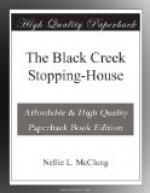“Yes, daughter, yes,” the little priest answered, a shadow coming into his merry grey eyes. He gave her an evasive reply, and then murmured to himself, as he picked a handful of orange lilies: “It is an institution of the Evil One to sow discord among brothers.”
The walk began.
First came the fife and drum, skirling out an Orange tune, at which the little priest winced visibly. Then followed Thomas Shouldice, in the guise of King William. He was mounted on his own old, spavined grey mare, that had performed this honorable office many times in her youth. But now she seemed lacking in the pride that befits the part. Thomas himself was gay with ribbons and a short red coat, whose gilt braid was sadly tarnished. One of the Yankees had kindly loaned a mottled buggy-robe for the saddle-cloth.
Behind Thomas marched the twenty-three-verse soloist and the other faithful few, followed by the seven Breeze boys, gay with yellow streamers made from the wrapping of a ham.
The Yankees grouped about were sorry to see so few in the procession. They had brought along three or four of their band instruments to furnish music if it were needed. As the end of the procession passed them, two of the smaller boys swung in behind the last two Breezes.
It was an inspiration. Instantly the whole company stepped into line— two by two, men, women, and children, waving their bunches of lilies!
Thomas, from his point of vantage, could see the whole company following his lead, and his heart swelled with pride. Under the arch the procession swept, stepping to the music, the significance of which most of the company did not even guess at—good-natured, neighborly, filled with the spirit of the West, that ever seeks to help along.
Everyone, even Father O’Flynn, was happier than James Shewfelt, the drummer.
The fifer paused, preparatory to changing the tune. It was the drummer’s opportunity. “Onward, Christian Soldiers,” he sang, tapping the rhythm on the drum. The fifer caught the strain. Not a voice was silent, and unconsciously hand clasped hand, and the soft afternoon air reverberated with the swelling cadence:
“We are not divided,
All one body we.”
When the verse was done the fifer led off into another and another. The little priest’s face glowed with pleasure. “It is the Spirit of the Lord,” he whispered to himself, as he marched to the rhythm, his hand closely held by the smallest Breeze boy, whose yellow streamers and profuse decoration of orange lilies were at strange variance with his companion’s priestly robes. But on this day nothing was at variance. The spirit of the West was upon them, unifying, mellowing, harmonizing all conflicting emotions—the spirit of the West that calls on men everywhere to be brothers and lend a hand.
The Church of England minister did make a speech, but not the one he had intended. Instead of denominationalism, he spoke of brotherhood; instead of religious intolerance, he spoke of religious liberty; instead of the Prince of Orange, who crossed the Boyne to give religious freedom to Ireland, he told of the Prince of Peace, who died on the cross to save the souls of men of every nation and kindred and tribe.




